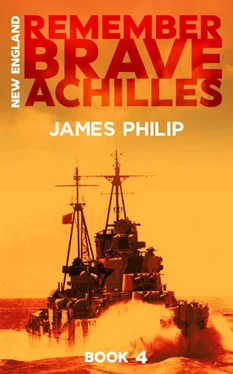However, Von Reuter knew that this was not what the other man actually wanted to talk about. He dragged his mind away from professional, naval considerations.
“Yes, Your Grace,” he retorted brusquely. “Unfortunately, with so many untrained supernumeraries aboard, many men who might otherwise be engaged on repair and other work making good battle damage, must be detailed to care for the wounded.”
Gravina blanched at deliberately pejorative use of the word supernumeraries .
“It was always anticipated that it would take a little while for men of Las Armada de Nuevo Granada to ‘bed in’, Admiral Reuter,” he said testily.
What really worried von Reuter was that on some of the smaller ships of the squadron, the influx of idle hands and the exodus of so many veterans had had a near disastrous impact on discipline, efficiency and combat-worthiness.
And shortly he was going to be confronted by the entire might of the British Atlantic Fleet!
Von Reuter still found it very hard to believe – incomprehensible, in fact – that a couple of ancient float planes had managed to cripple a modern cruiser like the Karlsruhe . But then a lot of things about yesterday’s battle had come as a very, very rude shock even to a man like he, who had never, not for a moment, underestimated the war-fighting prowess of the English.
Gravina’s voice broke into his thoughts.
“The Governor-General of Cuba has received representations from the Lord High Inquisitor of Havana demanding to know when the British survivors will be transferred ashore into his,” the Minister of the Las Amada de Nuevo Granada hesitated, “safe keeping?”
Von Reuter gazed past the Mexican’s shoulder to where the SMS Weser rode at anchor.
The Weser was an old Hamburg-Atlantic liner converted for navy-service as a general supply, troop-cum-hospital ship some years ago which had served as a base ship at San Juan, for visiting Kaiserliche Marine ships and squadrons. It was at the naval base at San Juan that she had been secretly converted for commerce raiding last autumn, equipped with four concealed, main deck mounted 6-inch guns and quadruple torpedo tubes installed below the waterline. A fortnight ago, she had been quietly moved to Guantanamo Bay, the intention being to transfer her to Kingston, Jamaica, as soon as things quietened down, using her modern electronics suite to act as a communication relay for rest of the fleet, or, if circumstances warranted, to range the Caribbean as a commerce raider. It was typical of the Admiralty in Berlin’s parsimony to attempt to combine the wholly discrete re-supply, hospital ship and commerce raiding roles in a single ship.
It was too late to do anything about that now…
Nobody imagined that the Royal Navy was going to allow reinforcements, further ships from Germany to arrive in the foreseeable future. So, the ships that von Reuter had to hand were, bluntly, it for the time being.
“The surviving members of the crew of the Achilles surrendered to German officers, Your Grace,” von Reuter reminded the other man. “In the absence of guarantees from the authorities onshore I cannot, in honour, abrogate my responsibilities under the conventions of the Treaty of Paris. They will remain on board the Weser and on the other ships for the moment. Until, the situation is clearer.”
“I command this fleet,” Gravina smiled thinly.
“Yes. But I command my men.”
Problematically, although the then Spanish King-Emperor, Alfonso XI, had ratified the Treaty of Paris in its entirety, including the conventions relating to prisoners of war and non-combatants caught up in battlefields, or other so-called ‘contested areas’, back in the late 1860s and early 1870s, none of Madrid’s American crown colonies had followed suit. A century ago, nobody had thought this was important. Unfortunately, given that in recent decades the ever-more nominal ‘crown colonies’ had become openly self-governing, self-determining entities which paid little or no lip service to Old Spain, right now this was suddenly a matter of the utmost significance to anybody who was considered a ‘prisoner of war’ or an ‘enemy non-combatant’. Basically, if you fell into either category you had no rights; you were literally, at the mercy of your captives.
“Presumably,” Gravina went on, “you plan to hold the British prisoners as hostages? Insurance, in the event your government disowns you?”
The German glared at the other man.
“If we were in Berlin,” he rasped, coldly, “I would demand satisfaction on the field of honour of any man who besmirched my name, and the name of my family, with such a slur, Your Grace.”
The Mexican thought this was some kind of joke.
“Well, we’re not in Berlin now, Admiral Reuter.”
“No, we’re not!”
Gravina shrugged.
“You don’t look too well, Admiral?”
Von Reuter had no intention of retiring to his sick bed for forty-eight hours – a half-hearted, half-serious suggestion from the ship’s over-worked surgeon – because by the time he returned to duty it was odds on, that Gravina and the gang of sycophantic political place men masquerading as an admiral’s staff, would have sunk the flagship by then!
“As to the matter of the treatment of Europeans,” von Reuter declared, fed up with sparring. “It was written into the concordat covering the handover of my ships to Las Armada de Nuevo Granada, that Europeans, that is, the crews of my ships and other parties who might come aboard on legitimate Navy business, will be unconditionally exempted from local theocratic authority…”
“That form of words was never designed to cover prisoners, apostate enemies of the one true faith.”
“There was never supposed to be a war, Your Grace!”
“You and I are but servants of greater princes, Admiral von Reuter. You would do well to remember that.”
“I need no man to remind me of my duty.”
Gravina thought about this.
“As you wish. I must go ashore and pay my respects to the Provincial Governor.” The other man made as if to go, hesitated, and observed with unusual respect: ‘You were right about that ship. The Achilles was indeed a most formidable foe!”
The Mexican turned on his heel and, with his over-large entourage falling into step headed down to the main deck where a barge waited alongside the midships gangway.
Von Reuter turned and gazed over the armoured crests of the forward main battery turrets, past the cruiser’s clipper bow at the verdant low hills beyond the sprawl of port buildings and the shanties where most of the workers lived, despoiling what might otherwise be a second, tropical Eden. The tallest buildings were the churches, the tower and spires of two attracted his eye, reminding him of the inherent disconnect between the rational men of the Wilhelmstrasse, the Navy Ministry and within the Royal Palaces of Berlin, and the essential irrationality of the religious zealots in charge in Cuba, Santo Domingo, Hispaniola and probably, in New Granada, also. What looked so simple, pragmatic if one contemplated any map of the region was anything but when an overdose of theocratic fundamentalism was thrown into the mix.
Von Reuter’s head hurt.
Not just from his wounds.
Yesterday had been the great test of his naval career and he had an awful, sinking feeling that he had failed – abjectly – his Kaiser, and the men on his ships.
Von Reuter had half-assumed, and if he was being honest with himself, hoped that the Achilles would use her speed and agility to attempt to escape the trap he had laid for her in the Windward Passage. Had the British cruiser’s first manoeuvre been to reverse course and run north at her best speed – probably at least thirty-two or three knots – and if he had not been able to hit her hard enough to slow her down in the first minutes of the action, after an hour, maybe two, he would have been obliged to call off the stern chase. The danger of coming upon a more powerful Royal Navy Squadron in these waters was far too great. Not least, because the Cuban and the Dominican Air Forces had ignored his increasingly urgent requests, and then pleas, for systematic aerial reconnaissance of their northern waters, particularly the approaches to the Windward Passage south of Great and Little Inagua Islands.
Читать дальше












